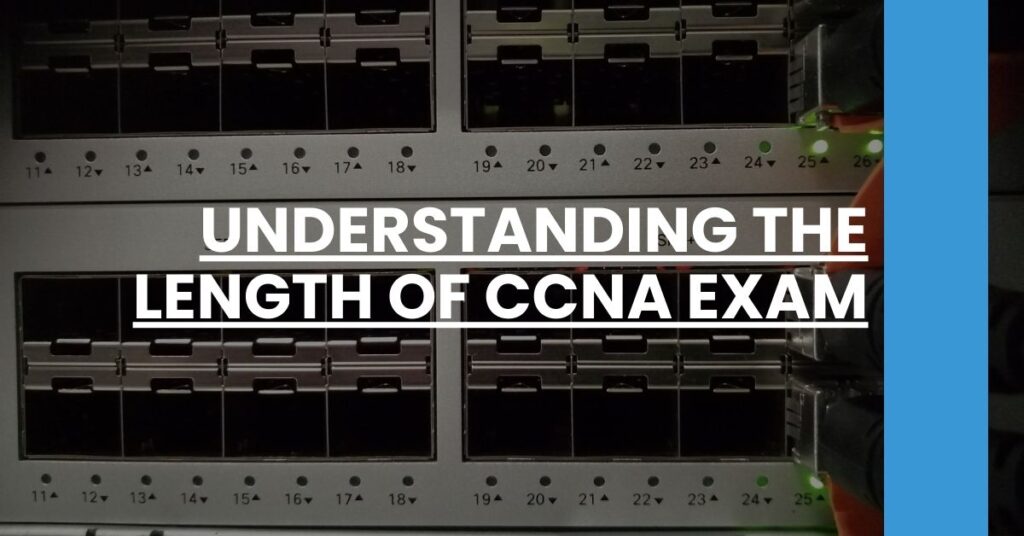The Cisco Certified Network Associate (CCNA) exam, a pivotal step for IT professionals, has a set time limit of 120 minutes. Within this period, candidates face various question types including multiple-choice and simulation tasks.
Wondering how to best utilize those minutes?
By the end of this read, you’ll have insights on:
- Strategic study tips
- Effective time management during the test
- Post-exam steps
Armed with this knowledge, you’ll be poised to maximize your CCNA exam experience.
- Introduction to the CCNA Certification
- Overview of the CCNA Exam
- Exam Duration: How Long Is the CCNA Test?
- Preparing for the Exam: Study Time and Strategies
- Tips to Manage Time During the CCNA Exam
- After the Exam: Understanding Results and Next Steps
- Frequently Asked Questions About the CCNA Exam Duration
- Changes to the CCNA Over Time
- Conclusion: Maximizing Your CCNA Exam Experience
Introduction to the CCNA Certification
Imagine you’re embarking on a journey to become a recognized professional in the networking world. That’s where the Cisco Certified Network Associate (CCNA) certification comes into play. As a stepping stone for many IT careers, the CCNA is an associate-level certification designed to assess your knowledge and competence in network fundamentals, network access, IP connectivity, IP services, security fundamentals, and automation and programmability. Whether you are an aspiring network engineer or a seasoned technician looking to validate your skills, the CCNA certification is critical for anyone looking to establish credibility and advance in the field of networking.
Over the years, the qualification has become a benchmark for network professionals, opening doors to numerous job opportunities and providing a competitive edge in the industry. If you’re determined to propel your career forward and stand out in a competitive job market, getting your CCNA certification is a strategic move you’ll want to make.
Overview of the CCNA Exam
The CCNA exam is administered by Cisco Systems, aiming to verify your understanding and proficiency in various networking concepts and hardware. The current iteration of the exam, known as the 200-301 CCNA, covers a wide array of topics to reflect the latest networking technologies, trends, and job roles. It’s crafted to test your skills in installing, operating, and configuring basic IPv4 and IPv6 networks.
As you set your sights on this significant career milestone, understanding the structure and the demands of the assessment is paramount. You’ll encounter a variety of question formats, including multiple-choice, simulations, and hands-on exercises.
Now, let’s get to the point you’re most curious about: How long is the CCNA exam? You’ll have 120 minutes to demonstrate your networking prowess. It may sound daunting, but with the right preparation, you can approach this timed challenge with confidence.
Exam Duration: How Long Is the CCNA Test?
Naturally, the question of time comes up when planning for an exam as crucial as the CCNA. Knowing the exact duration is essential as you strategize your study plan and test-taking tactics. The CCNA exam will test your ability to manage a variety of problems efficiently within an allocated time frame of 120 minutes. Facing roughly 100 to 120 questions, each moment counts as you navigate through theoretical questions and practical tasks.
Effective time management during this period is your lifeline. With an average of just about a minute to analyze and respond to each question, your ability to quickly understand and tackle problems will be put to the test. But don’t be intimidated. As you’ll discover shortly, thorough preparation and a well-thought-out strategy can make all the difference.
Preparing for the Exam: Study Time and Strategies
When endeavoring to conquer the CCNA exam, one of the most pressing questions you might have is, “How much time should I dedicate to studying?” There’s no one-size-fits-all answer here, as each individual’s experience and familiarity with networking concepts can greatly vary. However, a common recommendation is to aim for a solid three to six months of consistent study, allowing you to delve deeply into each exam topic and gain the hands-on experience necessary to succeed.
Developing a study routine tailored to your learning style is crucial. Here are some steps you might consider:
- Establish a Study Schedule: Block out dedicated time each day or week for studying. Consistency is key.
- Curate Quality Study Material: Invest in reputable resources like official Cisco materials or well-reviewed third-party guides.
- Blend Learning Techniques: Combine reading, video courses, lab exercises, and practice tests to reinforce learning and simulate the exam environment.
- Join Study Groups: Collaborating with peers can provide motivation and expand your understanding through discussion.
- Track Progress: Set milestones to evaluate your understanding of the material and your readiness for the exam.
Be sure to incorporate various study methods, such as setting up a home lab or using virtual simulation tools, to hone your practical skills. Practice exams are particularly worthwhile—they not only familiarize you with the question format but also help you refine your time management skills.
Remember, the ultimate goal is to walk into the testing center with confidence, comprehensive knowledge, and the ability to think on your feet. Now, let’s dive deeper into time management strategies that can help you tackle the CCNA exam duration effectively.
Tips to Manage Time During the CCNA Exam
Successfully navigating the CCNA exam not only tests your technical expertise but also your time management skills. With the clock ticking and a mix of complex questions before you, a clear strategy for pacing yourself is indispensable. So, how do you ensure you’re making the best use of the allocated 120 minutes?
Here are some time management tips to help you stay on track:
- Prioritize Questions: Quickly gauge the complexity of each question. Tackle the ones you’re confident about first, and mark the more challenging ones to revisit if time allows.
- Keep Track of Time: Allocate a maximum time to spend on each question. It might help to check the clock after every few questions to stay aware of your pacing without becoming obsessive.
- Practice Makes Perfect: Mock exams are a brilliant way to practice time management in a simulated environment. Try to mimic the exam conditions as closely as possible.
- Read Carefully, But Efficiently: Understand what each question is asking, scanning for keywords and essential details to minimize misunderstandings that cost valuable time.
- Stay Calm: Anxiety can waste precious minutes. Strategies to keep calm under pressure will pay dividends in the exam room.
During your studies, experiment with different time management techniques to find what works best for you. Remember, your goal is not only understanding the subjects at hand but also learning to express that knowledge succinctly and accurately within the given time frame. Managing time wisely could be the differentiator between passing and excelling in the CCNA exam.
After the Exam: Understanding Results and Next Steps
Once you’ve submitted your exam and taken that deep, well-earned breath of relief, anticipation naturally builds around your results. Thanks to Cisco’s efficient process, you won’t be left in suspense for long. Preliminary scores are typically made available right after you complete the test, giving you an immediate sense of how you performed. This instant feedback will indicate whether you’ve passed or if you need to regroup and prepare for a second attempt.
Official results, including a detailed score report, often follow via email about an hour later. If your screen celebrates a passing score, congratulations are in order—your hard work has paid off, and the CCNA certification is now within your grasp. But what if the outcome isn’t what you’d hoped for? First, don’t lose heart. Reflect on the experience—what areas were more challenging, and how can you adjust your prep for a subsequent try? Retake policies and next steps are clearly outlined by Cisco, so regroup, refocus, and set your sights on the next exam date.
The celebration or reflection time post-exam is also a good moment to start pondering your career trajectory. With the CCNA under your belt or on the horizon, considering your next move—be it advancing to higher certifications or exploring new job roles—is the logical next step in leveraging the time and effort invested in your certification journey.
Frequently Asked Questions About the CCNA Exam Duration
As we delve into frequently asked questions, it’s crucial you understand the ins and outs of how long the CCNA exam is along with specifics like breaks, and what happens if you need to retake the test. No detail is too small when you’re aiming for a seamless test-taking experience.
- Are There Scheduled Breaks During the CCNA Exam?
Unfortunately, no scheduled breaks are built into the 120-minute exam period. Time management, as stressed earlier, comes into play here, not just for answering questions but also for personal comfort. It’s a good idea to visit the restroom and hydrate before starting. - What If I Need to Retake the Exam?
Cisco’s retake policy stipulates that candidates who fail their first attempt must wait at least five calendar days before their next go. This grace period is your opportunity to re-assess and bolster your prep where necessary. - Can I Skip Questions or Come Back to Them Later?
Yes, you can flag questions for review and return to them later within the exam period. Just be mindful of the time and make sure to revisit only after you’ve addressed the more straightforward questions.
If you have further questions or need clarification, resources like Pearson VUE’s FAQs are invaluable. Remember, being well-informed can help reduce exam day anxiety and contribute significantly to your overall performance.
Changes to the CCNA Over Time
Whether you’re a newcomer to the world of networking or you’ve been charting its evolution, understanding the historical shifts in the CCNA exam can be enlightening. Since its inception, the CCNA has experienced various revisions to keep pace with the ever-evolving networking landscape—from the simple early versions focused on basic networking skills to today’s comprehensive assessments that include newer concepts like network automation and cybersecurity.
Every update to the exam, such as those seen in 2019 characterized by a shift towards modern network requirements, signifies the industry’s direction and Cisco’s commitment to maintaining relevance in certification standards. As you embark on your CCNA journey, be assured that the knowledge and skills verified by the exam will arm you with the expertise needed to thrive in the current tech environment.
Conclusion: Maximizing Your CCNA Exam Experience
Embarking on the CCNA exam is a testament to your dedication to professional growth within the networking industry. Understanding the precise length of the CCNA exam—a succinct 120 minutes—allows you to strategically plan your study time, refine your approach to the questions posed, and maximize every second of the examination period to showcase your knowledge and problem-solving abilities. With a clear grasp of the format, time allocation, and examination techniques shared here, you’re now well-equipped to approach your CCNA certification with greater ease and confidence.
Good luck, and may your networking journey be as rewarding as it is challenging!

